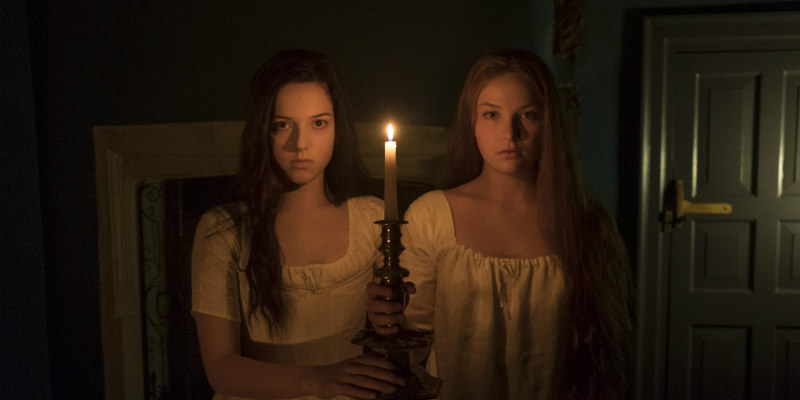
A lonely teenage girl receives a new companion in the form of a
mysterious young survivor of a carriage crash.
Review by
Eric Hillis
Directed by: Emily Harris
Starring: Hannah Rae, Devrim Lingnau, Tobias Menzies, Greg
Wise, Jessica Raine, Colin Blumenau, Daniel Tuite, Lorna Gayle

What must it have been like to be a young, cinemagoing lesbian in the
early 1970s? Your sexuality was still far from being accepted yet on the
cinema screen lesbian vampires couldn't sink their teeth into their
same-sex victims quickly enough. Until quite recently, the lesbian vampire
movies of that period -
The Vampire Lovers,
Vampyres, Daughters of Darkness, The Blood Spattered Bride
and Vampyros Lesbos, to name but a few - represented the closest we had come to being
presented with something approaching a mainstream queer cinema
canon.
The concept of the lesbian vampire has its roots in Irish writer Sheridan Le Fanu's 1872 novella 'Carmilla', which precedes its more famous Irish literary vampire cousin, Bram Stoker's 'Dracula', by 26 years. When it comes to vampire fiction, the gays got there first. It's no surprise that Carmilla has inspired countless movies over the decades, as the sexualised modus operandi of the vampire provides filmmakers ample opportunity to combine those two elements which have rarely failed to sell tickets - sex and violence.

Today, in independent and arthouse cinema if not its mainstream equivalent, the need to cloak lesbianism in a vampire's cape no longer exists. As such, for her adaptation of Le Fanu's work, writer/director Emily Harris has stripped away the tale's supernatural element, leaving the existence of vampirism ambiguous.
[ READ MORE: New Release Review - I Never Cry ]
If you've seen any of the previous versions - Hammer's The Vampire Lovers being arguably the key adaptation - you'll be familiar with the narrative followed here. The location is unnamed, though it appears to be England, and the setting is a country manor. There resides Mr Bauer (Greg Wise), his teenage daughter Lara (Hannah Rae) and Lara's strict governess, Ms Fontaine (Jessica Raine). Bored out of her mind, Lara has been looking forward to being joined for the summer by another young lady who plans to reside in her home for the season, only to receive news that the girl in question has fallen ill, succumbing to some mysterious condition. Resigned to a summer of loneliness, Lara is thrilled when her father takes in a young girl (Devrim Lingnau) he found in the wreck of a crashed carriage.

The girl has no memory of where she came from (or at least that's how she tells it), and she can't even recall her name, so Lara gifts her the moniker 'Carmilla'. As Carmilla regains her strength, she begins to enchant Lara, stirring feelings she has never experienced, and it's not long before the two are...well, necking.
[ READ MORE: New Release Review - Riders of Justice ]
Where Harris's film strays furthest from previous adaptations of Le Fanu's tale is in focussing as much on Ms Fontaine as on her young charge. As Lara's sexuality blossoms, so too does something stir deep in Fontaine's soul, something she has fought against and kept repressed. Aware of the relationship developing between Lara and Carmilla, Fontaine grows increasingly frustrated, and the sublime Raine plays her like she's constantly suppressing either an orgasm or a scream, or perhaps both. In one delicately directed scene, Fontaine waits at the breakfast table for Lara, who is suspiciously late this morning. Harris holds her camera on the governess as she pours her tea and butters her scone, pretending all is normal, but you can see on her face just how tortured she is by the idea that Lara is indulging in a pleasure she has denied herself.

Harris has co-directed two features previously with collaborator Jonathan Bentovim, but this is essentially her feature debut, and it's quite the entrance. Shot in one of those grand old creaky manors that pepper the English countryside, Carmilla has the feel of some lost instalment of the BBC's '70s 'A Ghost Story for Christmas' anthology. Visually, Harris and cinematographer Michael Wood divide up the house in two distinct palettes - warm and amber for the domain of the passionate Carmilla and Lara, cold and teal for the rooms Fontaine occupies. As the story progresses and Carmilla's influence grows, so too does the film become warmer, as though the many candles lighting the house are somehow more alive. Harris frequently cuts to extreme close-ups of worms, insects and spiders, which themselves seem to be stirred into some sort of a frenzy, as though nature itself is in heat.
Were it not for the stories of other young girls in the locale falling ill without rational diagnoses, Carmilla might be the unambiguous heroine of Harris's film. Let's face it, who doesn't root for Ingrid Pitt when she comes up against the stuffy bastions of a society that's rigidly straight in every sense of the word? When Carmilla introduces Lara to her world of blood and flesh, we're not hoping the latter sees sense and backs off, but rather we're willing her to follow what is clearly her true destiny. Ultimately, like most vampire tales with a lesbian bent, Carmilla is a tragedy, as the unconventional young lovers find themselves targeted by a society that can't, or won't, accept their libertine spirits.

Carmilla is on Amazon Prime Video
UK now.
